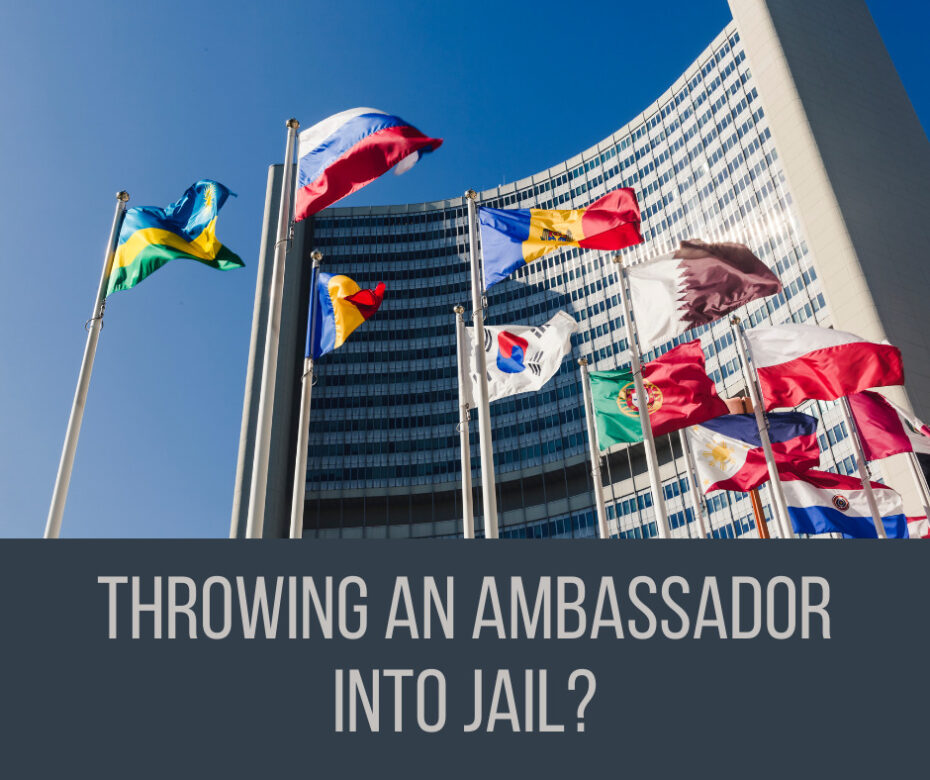My dad was a career Army man, so while growing up I lived in some foreign countries. I remember in one country I was given a special ID card because of where my dad worked. The ID card stated that I could not be arrested in that country. If I violated the law, police authorities could only take my name. Afterwards, they had to release me.
I was only 12 years old but I thought that was the coolest thing in the world. Looking back, I am sure that if I had committed a serious crime, the US authorities would have turned me over to the local authorities. But it was kind of like being a mini ambassador.
An ambassador of a country lives in a foreign country and represents the government of his homeland. We have all heard stories about their privileges. If an ambassador commits a crime, even a very serious one, the host country will not prosecute him. The ambassador will be sent home but will not face the consequences of his actions in the land where he committed his crime. Ambassadors even have special license plates on their cars to let police know they have a get-out-of-jail-free card. They can’t even get speeding tickets. Occasionally we hear about ambassadors who get away with murder. The ambassador of Burma in Sri Lanka actually killed his wife and burned her body in the back yard. He was never prosecuted.
The people in the host country, when they hear of such outrageous things, understandably get upset. They wonder how a visitor to their country can have immunity when the citizens themselves do not. The reason is that the host country values the relationship it has with the home country of the ambassador. The actions of one man are not as important as the advantages of diplomatic ties between countries. To arrest and punish an ambassador would be like attacking his native land.
The only time I have ever heard of a US ambassador getting into serious trouble (even though I am sure there are others) was in 2012. Terrorists killed the US ambassador and three other Americans in Benghazi, Libya. Even in this situation, the murderers were acting outside of government approval. In fact, the Libyan government condemned what happened.
In light of all this, Paul in Eph 6:20 uses what could be called a shocking description of himself when he says that he is “an ambassador in chains.” Paul was in a Roman prison, which explains the chains. But whoever heard of an ambassador being arrested and thrown in jail by the governing authorities? To make matters worse, Paul had not committed any crime at all.
When one considers that Paul was an apostle of Jesus Christ, this description of Paul is even more unusual. Jesus is seated at the right hand of God His Father. Jesus will one day rule over all of creation and will do so forever. He was the One who had commissioned Paul for his work. Paul was the representative of the most powerful Man in history. He was an ambassador for the kingdom of God. If anybody should have been granted a get-out-of-jail-free card and special license plates, it was Paul.
Of course, the reason Paul was an ambassador sitting in a jail was that the country he was serving in did not recognize the authority that had sent him. Jewish leaders had convinced the Roman government to imprison and try him. Paul’s very life was at stake.
The world does not recognize the coming kingdom of God. But that is the future home of every one who has ever believed in the coming King for eternal life. In a very real sense, every believer is called to be an ambassador in this world for Jesus Christ.
But the world does not give us a special ID card with special privileges. We do not have immunity from opposition in the country in which we live. In fact, the opposite is true. We may or may not ever experience literal chains, like Paul did for his service as an ambassador. But we are still called to be our King’s representatives. We may not get any benefits from the country where we serve as His representatives, but think about the rewards the King will give us at His Judgment Seat if we serve Him well in the posts He has assigned us to.


